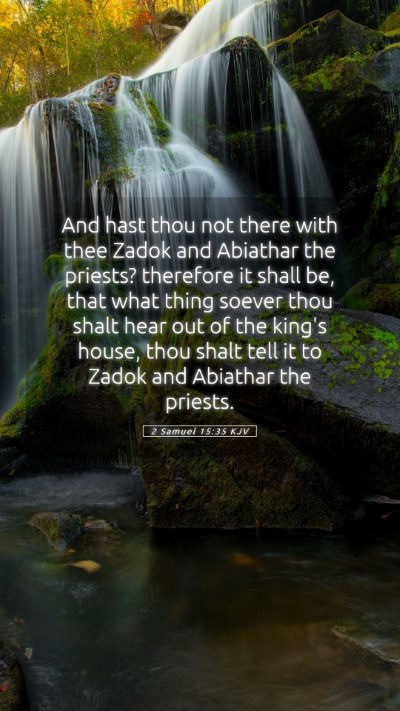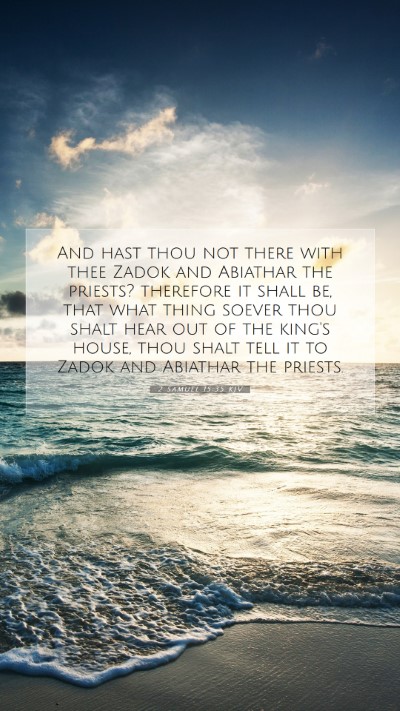Bible Verse Commentary: Understanding 2 Samuel 15:35
Verse Text: "And hast thou not there with thee Zadok and Abiathar the priests? therefore it shall be, that what thing soever thou shalt hear out of the king's house, thou shalt tell it to Zadok and Abiathar the priests."
General Overview
In this passage, we see David instructing his counselor, Hushai, about the roles of the priests Zadok and Abiathar during a time of turmoil in his reign. David, faced with Absalom's rebellion, is strategizing on how to gain crucial information about the dynamics in Jerusalem.
Insights from Public Domain Commentaries
-
Matthew Henry Commentary
Matthew Henry emphasizes the practicality of David's instructions. Here, he highlights the importance of having loyal allies who are established in positions of influence. By utilizing Zadok and Abiathar, David ensures that he remains informed about events in the palace, which is critical for maintaining his rule amid conflict.
-
Albert Barnes' Notes on the Bible
Albert Barnes notes the significance of communication in times of conflict. He points out how David recognizes the necessity for intelligence and how utilizing the priests allows for a secure line of communication. This shows David's wisdom in leveraging trusted individuals for vital information.
-
Adam Clarke's Commentary
Adam Clarke takes a deeper dive into the character of the individuals involved. He describes Zadok and Abiathar not only as priests but also as men of integrity. Their roles underscore the merging of spiritual leadership and political acumen, which is essential in times of crisis.
Bible Verse Analysis
This verse reveals several key themes relevant to both historical and modern contexts:
- The Role of Counsel and Communication: The importance of wise counsel is paramount. David’s reliance on Hushai to relay messages reflects the biblical principle that effective communication is vital for leadership.
- Trust and Loyalty: David's relationship with Zadok and Abiathar illustrates the centrality of trust and loyalty among allies, especially in critical times. It encourages readers to consider whom they trust and cultivate thriving relationships with.
- The Nature of Leadership: David’s strategy showcases the need for leaders to be proactive and wise in gathering information to make informed decisions. This serves as a lesson on the characteristics of effective leadership.
Cross References
- 2 Samuel 15:24-26: Discusses the actions of Zadok and Abiathar when David fled the city.
- 1 Chronicles 24:3: Provides genealogical background and roles of the priests.
- 2 Samuel 16:15-17: Further explores David’s counsel and the political dynamics during Absalom’s rebellion.
Application of 2 Samuel 15:35
This passage can be applied in various ways:
- **In Personal Life**: Reflect on the importance of trusted relationships. Who do you rely on for counsel?
- **In Group Settings**: In Bible study groups or community settings, discuss the implications of loyalty and trust in leadership roles.
- **In Leadership Roles**: Consider how to gather and communicate information effectively, similar to David’s approach.
Conclusion
In summary, 2 Samuel 15:35 offers profound insights into leadership, loyalty, and the critical nature of communication. Understanding such scripture teaches us not only about historical events but also provides valuable lessons applicable to our everyday lives. As we delve deeper into the meanings of Bible verses, we are encouraged to form strong bonds of trust and loyalty, as illustrated by David and his priests.
Further Bible Study Resources
For those interested in exploring more about Bible verse meanings, interpretations, and studying techniques, consider utilizing the following resources:
- **Online Bible Study Tools**: Access various platforms for verse analysis and commentaries.
- **Bible Study Guides**: Look for guides that provide structured approaches to understanding scripture.
- **Bible Study Courses**: Enroll in courses that focus on the methodology of Biblical exegesis and interpretation.


